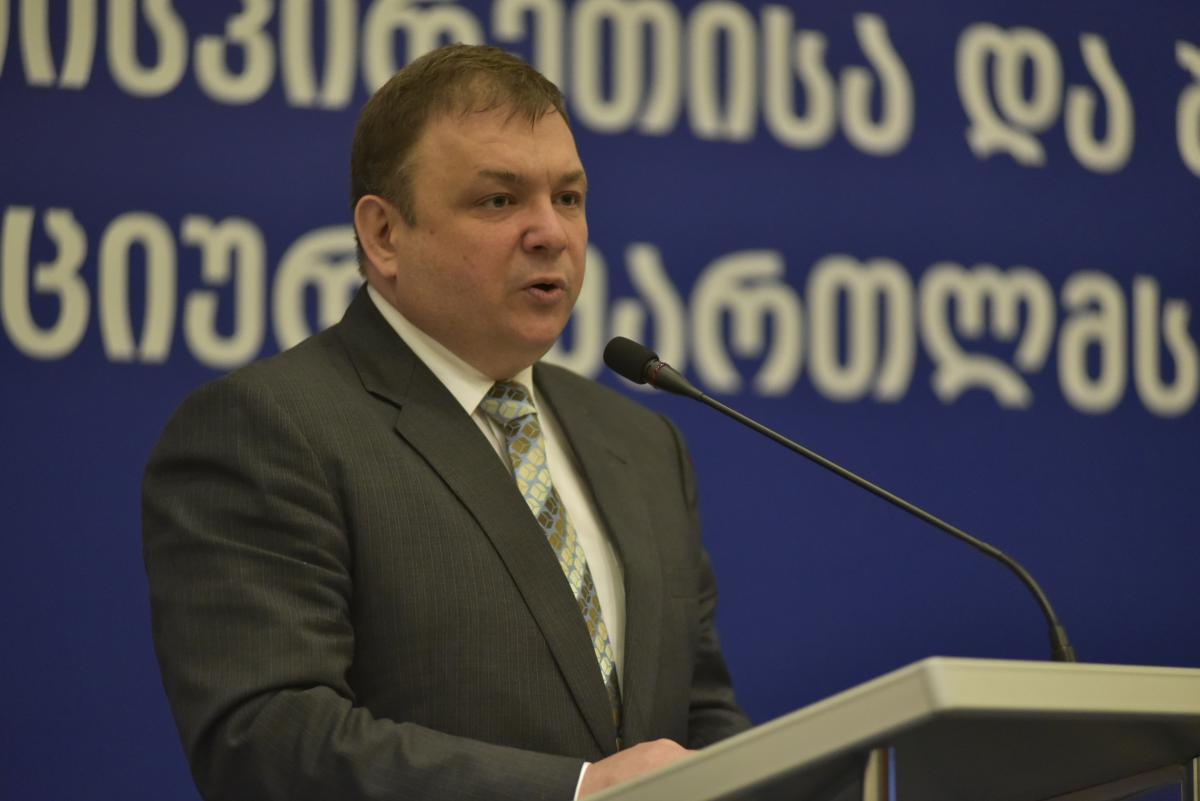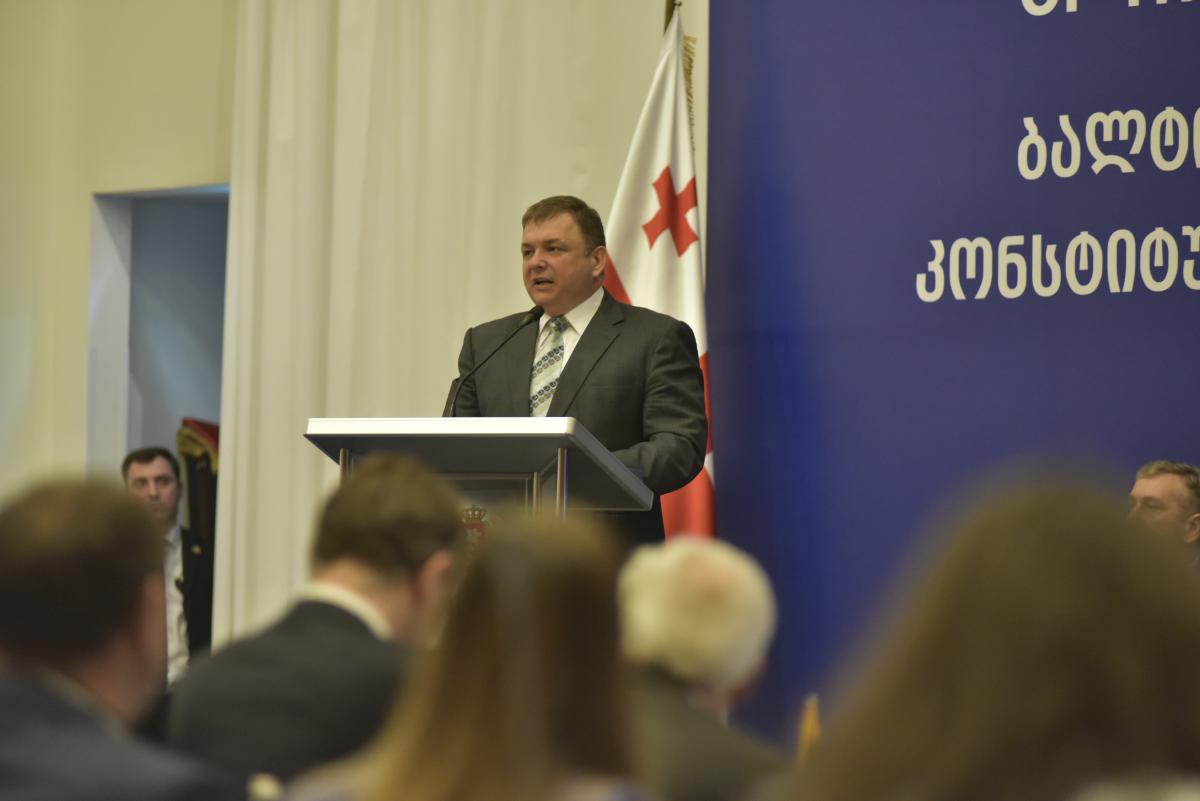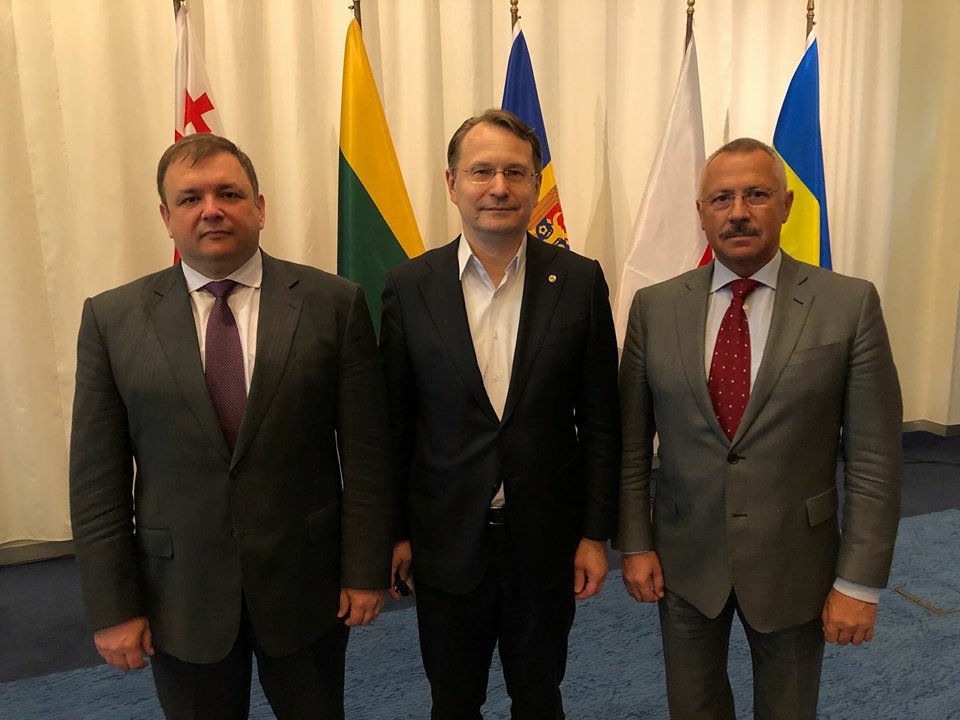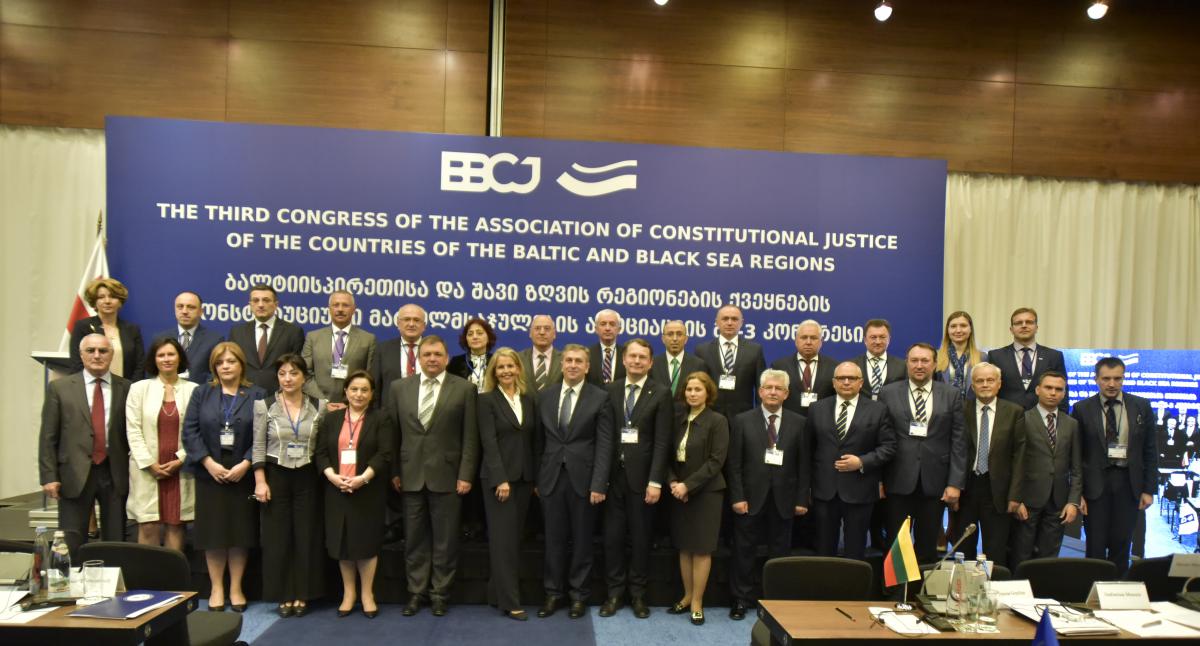The 3rd Congress of the Association of Constitutional Justice of the Countries of the Baltic and Black Sea Regions
21.05.2018
On May 17-18, 2018 the delegation of the Constitutional Court of Ukraine, headed by the Chairman of the Constitutional Court of Ukraine Stanislav Shevchuk, participated in the 3rd Congress of the Association of Constitutional Justice of the Countries of the Baltic and Black Sea Regions (BBCJ) on “The role of constitutional courts in the European integration procession”. The Ukrainian delegation was represented by the judges of the Constitutional Court of Ukraine Serhiy Holovaty, Viktor Kryvenko, and the scientific consultant of the judge of the Constitutional Court of Ukraine Nina Kucheruk.
The event was attended by representatives of constitutional courts – members of the BBCJ, judges of bodies of constitutional jurisdiction, representatives of international organisations and the diplomatic corps.
The BBCJ 3rd Congress was inaugurated by the President of Georgia Giorgi Margvelashvili, who emphasised the importance of this event in the context of strengthening the rule of law and ensuring the independence of constitutional courts in the implementation of constitutional justice. The speaker stressed on the universal values of the social, cultural and spiritual life of each nation, which are developed by constitutional, and strengthened by the bodies of constitutional control deepen.
The President noted that the Constitutional Court of Georgia fulfils  its function of interpreting the Constitution in the modern European context. The decisions and conclusions of the single body of constitutional jurisdiction of the country stimulate the development of the state, highlighted Mr. Margvelashvili.
its function of interpreting the Constitution in the modern European context. The decisions and conclusions of the single body of constitutional jurisdiction of the country stimulate the development of the state, highlighted Mr. Margvelashvili.
Concluding his speech, Giorgi Margvelashvili emphasised that the Georgian nation and the state have clearly defined the European direction of development since the restoration of independence and this direction will not change.
Prime Minister of Georgia Giorgi Kvirikashvili welcomed the Congress participants and noted that the Constitutional Court of Georgia has already become a full member of the “European family”, despite being one of the courts of the countries with “young democracy”. He expressed the conviction that the international recognition of the activities of the Constitutional Court of Georgia will continue to contribute to the development of a state system based on the rule of law.
The speaker thanked friendly countries for their important contribution to the development of the justice system of Georgia and noted that the role of the constitutional control body in strengthening the legal culture of society and civil values is undoubtedly significant. The state is most interested in creating the necessary conditions, in particular, legislative, administrative and material guarantees, for the smooth and free exercise by judges of their activities in the spirit of the best European traditions, highlighted Mr. Kvirikashvili.
Welcome speech was also delivered by the President of the Constitutional Court of Georgia, Chairman of the Association of Constitutional Justice of the Countries of the Baltic and Black Sea Regions Zaza Tavadze. He drew special attention to the BBCJ's goals, including the promotion of the protection of human rights and fundamental freedoms, guaranteeing democratic principles and values, and ensuring and enforcing the principles of the rule of law.
The BBCJ is an ambitious project of the four bodies of constitutional jurisdiction that are associated with common historical problems, our countries have much in common from the legal and political point of view, added the President of the Constitutional Court of Georgia. In his opinion, an important task for each of them is the protection of constitutional values in order to ensure democracy, human rights and freedoms.
Zaza Tavadze stressed on the relevance of the topic of the 3rd BBCJ Congress. The novelty of the topic is not the importance of constitutional courts in the implementation of political, economic and social reforms, but  the need to determine their role in the European integration process, mentioned the speaker. Thus, he added, the topic of the Congress is more specific and concerns, in particular, constitutional values, European law and judgements of the European Court of Human Rights, as well as the process of harmonisation of national and European legislation.
the need to determine their role in the European integration process, mentioned the speaker. Thus, he added, the topic of the Congress is more specific and concerns, in particular, constitutional values, European law and judgements of the European Court of Human Rights, as well as the process of harmonisation of national and European legislation.
Moreover, the President of the Constitutional Court of Georgia, Chairman of the BBCJ Zaza Tavadze congratulated the Constitutional Tribunal of the Republic of Poland as a full member of the BBCJ, and expressed the conviction that the Association will continue to expand and exchange valuable information on current issues regarding constitutional justice will contribute to the effective implementation of constitutional control.
The guests were also welcomed by the Chairperson of the Supreme Court of Georgia Nino Gvenetadze, Vice-President of the Venice Commission Herdis Thorgeirsdóttir, Deputy Head of the Delegation of the European Union to Georgia Carlo Natale, BBCJ representatives of the BBCJ, in particular, the President of the Constitutional Court of the Republic Lithuania Dainius Žalimas, Chairman of the Constitutional Court of Ukraine Stanislav Shevchuk.
Within the framework of the Congress, the Chairman of the Constitutional Court of Ukraine Stanislav Shevchuk, presented a report on “Harmonisation of the national legislation with the acquis communautaire”. He noted that Ukraine, having a common history, culture and traditions with European peoples, is establishing itself as a European state and has chosen the Pro-European vector of development for itself. One of the key principles of Ukraine's foreign policy is to ensure integration into the European political, economic and legal framework in order to acquire membership in the European Union. To accomplish this goal, Ukraine needs to fulfil a number of requirements of the Copenhagen criteria, as well as implement the most important aspect – adapting the legal system of Ukraine to the acquis communautaire.
In his opinion, adaptation of Ukrainian legislation with the acquis  communautaire is the basis for Ukraine's effective reforms taking into account the European legal framework. For Ukraine, as an associated member with EU (2014), the process of adapting national legislation is at the culmination stage, referring to all the key elements of the acquis communautaire, although it has a number of institutional and technical problems, mentioned Mr. Shevchuk.
communautaire is the basis for Ukraine's effective reforms taking into account the European legal framework. For Ukraine, as an associated member with EU (2014), the process of adapting national legislation is at the culmination stage, referring to all the key elements of the acquis communautaire, although it has a number of institutional and technical problems, mentioned Mr. Shevchuk.
The speaker informed that the process of convergence of the Ukrainian legislation with the acquis communautaire in the 2000s was accompanied by the creation of a mechanism for appropriate institutional provision. Adaptation of the Ukrainian legislation to the acquis communautaire implies not only the harmonisation of norms, but also the practice of their application, better reflected in the judgments of the European Court of Justice, added the Chairman. Therefore, for Ukraine, one of the priorities in the process of adaptation is to address the issue of taking into account the judgments of the EU Court of Justice when implementing the acquis communautaire, in particular by making appropriate changes to national legislation and concluding bilateral agreements with the EU.
Mr. Shevchuk mentioned that key aspect of the adaptation of the Ukrainian legislation with acquis communautaire is the determination of the place of the Constitution of Ukraine, which today in Ukraine has the highest legal force, and the EU acts. First of all, it concerns the application by the Constitutional Court of Ukraine of the principle of friendly attitude to international law as a method of constitutional interpretation, added the Chairman.
 Stanislav Shevchuk highlighted, according to the principle of friendly attitude to international law, the jurisprudence of the Constitutional Court should be consistent with the ECHR case-law. The ECHR case-law establishes minimum European standards, that is, standards for the protection of constitutional rights and freedoms a priori cannot be lower than European ones. The Chairman of the Constitutional Court of Ukraine Stanislav Shevchuk stressed that the legal systems of the EU and Ukraine, of course, have differences, but the nature of them is the same.
Stanislav Shevchuk highlighted, according to the principle of friendly attitude to international law, the jurisprudence of the Constitutional Court should be consistent with the ECHR case-law. The ECHR case-law establishes minimum European standards, that is, standards for the protection of constitutional rights and freedoms a priori cannot be lower than European ones. The Chairman of the Constitutional Court of Ukraine Stanislav Shevchuk stressed that the legal systems of the EU and Ukraine, of course, have differences, but the nature of them is the same.
Presenting the report “European Integration and Constitutional Justice: Lessons Learned by Lithuania”, the President of the Constitutional Court of the Republic of Lithuania Dainius Žalimas emphasised on the key role of the constitutional courts in carrying out the constitutional reforms of the European Union. He noted that solidarity, mutual support and exchange of experience are the source of strength for the BBCJ. It is important to preserve our common values – the rule of law, democracy, human rights, national independence and territorial integrity, emphasised Mr. Žalimas.
Reports were also presented by the Minister of Justice of the Republic of Moldova Victoria Iftodi ("Harmonisation of the National Legislation with EU Policies: Achievements and Perspectives"), Vice-President of the Constitutional Court of Georgia Merab Turava (“Approximation of National Constitutional Standards with the Acquis Communautaire according to the Case Law of the Constitutional Court of Georgia”), Vice-President of the Constitutional Court of Georgia Teimuraz Tughusi (“The Role of the Constitutional Court of Georgia in the Process of Legal Integration with the European Union”), Justice of the Constitutional Tribunal of Poland Justyn Piskorski, Judges of the Constitutional Court of the Republic of Moldova Aurel Baiesu (“Orientation towards European Values: Constitutional Jurisprudence of the Republic of Moldova”) and Veaceslav Zaporojan (“Constitutional Identity as a Limit for the EU Integration Process: Lessons for the Small States”).
In addition, the BBCJ General Assembly was held. According to the BBCJ Statute, the General Assembly is the body of the Association, through which it carries out its activities. The event was attended by representatives of five member-states of the BBCJ: Georgia, Republic of Lithuania, Republic of Moldova, Republic Poland and Ukraine.
Participants discussed the 4th Congress of the Association of Constitutional Justice of the Countries of the Baltic and Black Sea Regions. It was determined that the 4th Congress will be held in 2019 under the chairmanship of the Constitutional Court of Lithuania.
During the General Assembly, the Chairman of the Constitutional Court of Ukraine Stanislav Shevchuk presented a report on the chairmanship of the Constitutional Court of Ukraine in the Association in 2017.
The event was organised by the Constitutional Court of Georgia under the chairmanship of the Association of Constitutional Justice of the Countries of the Baltic and Black Sea Regions, in cooperation with Venice Commission of the Council of Europe.


